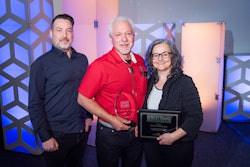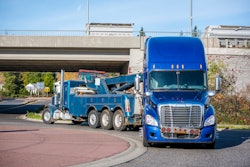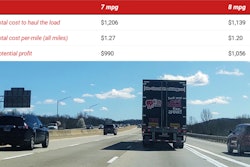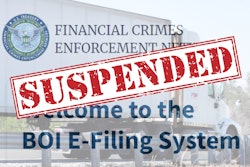Last Fall, owner-operators around the country started noticing brokers they had a long and solid history with just started denying them loads.
Dan Cohen, a Burlington, Vermont-headquartered owner-op hauled several loads for Axle Logistics under another carrier's authority, got cleared to haul under his own, and then "suddenly Axle said that per Highway's broker regulations, they mandated that because I have no ELD, I was disqualified, even though I have a pre-2000 engine, not requiring an ELD," an electronic logging device otherwise required of most interstate operations, he said. "Axle said it would not bend the rules for a glider truck, even though my 2000 Freightliner FLD120 with its 1996 engine is not a glider truck."
Highway, the "carrier vetting" platform, seems to have been on a tear. After a previous report about owners struggling with, or suspicous about, Highway's onboading platform with respect to ELD integrations, about half a dozen owner-ops said that big brokers who previously used Truckstop's RMIS service and green-lit them on dozens of loads switched over to Highway late last year and the freight stopped flowing.
[Related: Owner-operators allege Highway 'overstepping' with carrier onboarding process]

David Wheeldon, owner of Wheeldon Transport, is one such owner. He had a career in bomb disposal with the Marines, but still can't de-risk, so to speak, the ELD onboarding system through Highway enough for his liking.
"I just see very big security risks, and it’s just not me," said Wheeldon, referencing the FBI warning to industry in 2020 about the cyber vulnerabilities presented by ELDs.
Furthermore, Wheeldon's ELD, from the J.J. Keller provider, asks him to enter his password and username to integrate with Highway. "Everything we've ever been taught about cybersecurity says that's just a no-no."
Wheeldon isn't worried about some cyber criminal going to all the trouble to hack his ELD and shut his truck down. "I'm a very small fish," he said, but with his national security pedigree, he sees widespread ELD integrations with Highway and companies like it as potentially large points of failure and a generally big risk to the country.
"If China or some other actor wants to cause harm with the U.S. economy, now they don't have to hack into all these systems of hundreds and hundreds of different providers," said Wheeldon. "Now they only have to hack into Highway."
Cohen, Wheeldon and others had heard from Highway that it's Highway's broker customers that insist on ELD integrations, not Highway itself. With so many brokers agreeing to work with carriers before and the sudden shift to mandatory ELD integrations, how could that be? Was Highway pushing brokers towards ELD integrations? And if so, why?
Based on the queries we received from the readership, we put the below list of questions and concerns to Highway directly. The company roundly denied that it declines freight for anyone or asks for login credentials, tracks carriers outside of specific load agreements, or sells any ELD data.
Questions and responses were edited slightly to reduce redundancy.
Overdrive: Did Highway experience a significant shift in adoption around October-November 2024? Multiple carriers have reported that brokers previously using RMIS switched to Highway, particularly mentioning Axle Logistics.
Highway: Highway has seen increased adoption as more brokers recognize the importance of proactive fraud prevention and secure carrier onboarding. While we can't comment on specific brokers' decisions, we continue to expand our partnerships with brokers who are prioritizing security and efficiency in their carrier vetting processes. The shift in adoption could be due to brokers choosing to move away from legacy systems that don’t offer the same level of real-time verification and fraud prevention.
OVD: Under what circumstances does Highway require ELD integration to haul a load? Is it always at the broker’s request, or does Highway have a standard policy?
HW: Highway does not require ELD integration to haul a load -- brokers set their own policies. However, when Highway cannot establish a clear physical and digital footprint for a carrier, the carrier may be prompted to connect its ELD for verification.
Why ELD? Connecting an ELD helps verify a carrier’s identity, equipment, and operating status, giving brokers confidence in booking loads with vetted carriers.
Who decides? Brokers determine their own requirements, and some may prefer or require an ELD connection for added visibility.
Carriers who voluntarily connect their ELDs to Highway typically gain faster access to freight, as brokers prioritize verified carriers. Contact [email protected] for assistance.
OVD: The privacy policy states that ELD data is collected for marketing communications and product monitoring. Yet some carriers believe Highway's core purpose is to collect and resell ELD data. Does Highway sell ELD data?
HW: No. Highway does not collect, store, sell, or share ELD data for resale. The purpose of an ELD connection is to verify a carrier's identity and confirm active equipment when required by a broker. Highway only tracks location while a carrier is on a contracted load for a broker who requires it. This ends at the point of delivery. Once the load is completed, Highway does not retrieve or retain real-time location data. Highway performs periodic, limited checks to confirm the presence of active vehicles associated with the ELD account, but is not retrieving real-time location data.
Highway’s business model is built on software subscriptions for brokers. There is no monetization of ELD data. Our goal is to help brokers connect with legitimate, verifiable carriers while enabling carriers to access more freight.
[Related: ELDs, location tracking making brokers more annoying?]
OVD: Why does Highway ask carriers for their ELD login credentials, and what are the privacy/security implications? Carriers are concerned about sharing login credentials due to potential risks, such as the ability to de-rate an engine or shut down a truck remotely. How does Highway address these concerns?
HW: Highway does not ask for login credentials unless an ELD provider's API design requires it. Highway only accesses ELD data through secure, API-based integration with ELD providers. A carrier’s ELD account is not accessed by Highway team members.
- Highway does not alter account settings or make changes to a carrier’s ELD.
- Highway does not share API credentials with brokers or any third parties.
- Highway only accesses limited data needed to verify equipment presence and movement.
Highway does NOT collect:
- Hours of Service (HOS)
- Driver-related information
- Record of Duty Status (RODS)
- Safety events (harsh braking, collisions, etc.)
- Engine diagnostics or fault codes
Carriers retain full control over their ELD connection, and brokers do not have direct access to ELD data through Highway.
OVD: Has Highway considered the national security implications of consolidating ELD integrations? A carrier with a national security background raised concerns that if Highway integrates with all ELDs, it could become a single point of failure in the event of a cyberattack.
HW: Yes. Security is a core priority for Highway, and we apply bank-grade encryption and industry-leading security practices to ensure the integrity of our systems:
- SOC 2 Type II certification
- 256-bit AES and SSL/TLS encryption
- ISO 27001 conformity
While Highway integrates with multiple ELD providers, each connection is carrier-controlled and does not create a centralized vulnerability. Our approach prioritizes security and minimizes the risk of mass disruption in the event of a cyberattack.
OVD: What are the data privacy agreements between ELD providers and Highway? Does Highway receive ELD data only with carrier authorization, or can providers like Motive share data without carrier consent? Will Highway affirmatively state that it never takes ELD data without carrier approval?
HW: Highway only receives ELD data with the carrier’s authorization. Motive or any other ELD provider cannot share data with Highway without the carrier's consent. Carriers always have the ability to connect or disconnect their ELD at their discretion. Highway will never take or access ELD data without carrier approval.
OVD: Does Highway incentivize brokers to require ELD integration, or recommend it? Carriers report that brokers who previously didn’t require ELD integrations began doing so after switching to Highway.
HW: The threat of fraud is prolific and impacts all of us. The ELD connection between you (the carrier) and Highway builds trust with our broker partners (i.e., our customers) and secures the supply chain. For good reason, carriers with an ELD connected to Highway get access to the best freight. When Highway is unable to establish a clear physical and digital footprint for a carrier, the user will be automatically prompted to connect its ELD to Highway for verification of its equipment and recent movements.
While we know this approach to transparency is new, we are deeply convinced by the results. Our customers and carriers with connected ELDs report stronger partnerships and more secure operations in today’s supply chain.
OVD: What goes into flagging a truck as a glider kit? Some carriers claim they were wrongly flagged as having glider kit trucks when they had replaced an original engine. What criteria does Highway use to make this determination?
HW: We do not have the ability to accept ELD exemptions -- it is our customers who get to make ELD exemptions. When you make this claim [that you are ELD-exempt] with our customer, you may be prompted to upload your a) title or loan agreement, b) cab card or registration, and c) driver's license. These documents are included in an email sent directly to the customer for review. The hiring decision is adjudicated by our customer without input from Highway.
Note: We shared the Q&A with owner-operator David Wheeldon prior to publication, and he remained "personally not convinced" the company had taken all the security steps possible, he said. "Banks get hacked, too," and the security protocols Highway detailed in its answers he felt were "just kind of checking the box."
Meantime, he's personally paid the price for refusing to "surrender" to what he sees as coercive practice with respect to ELD integration, he said. "With the price of eggs lately, my wife and I sat down for breakfast and had to have one egg and not two." Maybe things look up when the market flips, perhaps in more ways than one -- how demanding can brokers be from the "carrier vetting" side when truckers are in high demand? Time will tell.
[Related: $10/month to vet yourself for a broker? Carrier vetting's latest turn]










